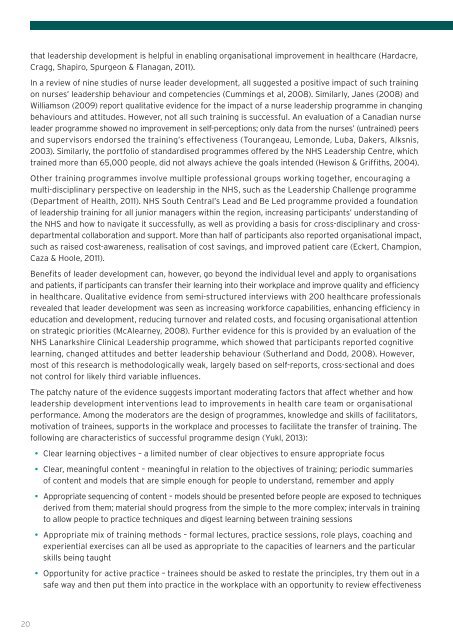leadership-leadership-development-health-care-feb-2015.pdf?dm_i=21A8,37JJV,FLXBMP,BHQ9G,1&utm_content=buffer668ab&utm_medium=social&utm_source=twitter
leadership-leadership-development-health-care-feb-2015.pdf?dm_i=21A8,37JJV,FLXBMP,BHQ9G,1&utm_content=buffer668ab&utm_medium=social&utm_source=twitter
leadership-leadership-development-health-care-feb-2015.pdf?dm_i=21A8,37JJV,FLXBMP,BHQ9G,1&utm_content=buffer668ab&utm_medium=social&utm_source=twitter
Create successful ePaper yourself
Turn your PDF publications into a flip-book with our unique Google optimized e-Paper software.
that <strong>leadership</strong> <strong>development</strong> is helpful in enabling organisational improvement in <strong>health</strong><strong>care</strong> (Hardacre,<br />
Cragg, Shapiro, Spurgeon & Flanagan, 2011).<br />
In a review of nine studies of nurse leader <strong>development</strong>, all suggested a positive impact of such training<br />
on nurses’ <strong>leadership</strong> behaviour and competencies (Cummings et al, 2008). Similarly, Janes (2008) and<br />
Williamson (2009) report qualitative evidence for the impact of a nurse <strong>leadership</strong> programme in changing<br />
behaviours and attitudes. However, not all such training is successful. An evaluation of a Canadian nurse<br />
leader programme showed no improvement in self-perceptions; only data from the nurses’ (untrained) peers<br />
and supervisors endorsed the training’s effectiveness (Tourangeau, Lemonde, Luba, Dakers, Alksnis,<br />
2003). Similarly, the portfolio of standardised programmes offered by the NHS Leadership Centre, which<br />
trained more than 65,000 people, did not always achieve the goals intended (Hewison & Griffiths, 2004).<br />
Other training programmes involve multiple professional groups working together, encouraging a<br />
multi-disciplinary perspective on <strong>leadership</strong> in the NHS, such as the Leadership Challenge programme<br />
(Department of Health, 2011). NHS South Central’s Lead and Be Led programme provided a foundation<br />
of <strong>leadership</strong> training for all junior managers within the region, increasing participants’ understanding of<br />
the NHS and how to navigate it successfully, as well as providing a basis for cross-disciplinary and crossdepartmental<br />
collaboration and support. More than half of participants also reported organisational impact,<br />
such as raised cost-awareness, realisation of cost savings, and improved patient <strong>care</strong> (Eckert, Champion,<br />
Caza & Hoole, 2011).<br />
Benefits of leader <strong>development</strong> can, however, go beyond the individual level and apply to organisations<br />
and patients, if participants can transfer their learning into their workplace and improve quality and efficiency<br />
in <strong>health</strong><strong>care</strong>. Qualitative evidence from semi-structured interviews with 200 <strong>health</strong><strong>care</strong> professionals<br />
revealed that leader <strong>development</strong> was seen as increasing workforce capabilities, enhancing efficiency in<br />
education and <strong>development</strong>, reducing turnover and related costs, and focusing organisational attention<br />
on strategic priorities (McAlearney, 2008). Further evidence for this is provided by an evaluation of the<br />
NHS Lanarkshire Clinical Leadership programme, which showed that participants reported cognitive<br />
learning, changed attitudes and better <strong>leadership</strong> behaviour (Sutherland and Dodd, 2008). However,<br />
most of this research is methodologically weak, largely based on self-reports, cross-sectional and does<br />
not control for likely third variable influences.<br />
The patchy nature of the evidence suggests important moderating factors that affect whether and how<br />
<strong>leadership</strong> <strong>development</strong> interventions lead to improvements in <strong>health</strong> <strong>care</strong> team or organisational<br />
performance. Among the moderators are the design of programmes, knowledge and skills of facilitators,<br />
motivation of trainees, supports in the workplace and processes to facilitate the transfer of training. The<br />
following are characteristics of successful programme design (Yukl, 2013):<br />
• y Clear learning objectives – a limited number of clear objectives to ensure appropriate focus<br />
• y Clear, meaningful content – meaningful in relation to the objectives of training; periodic summaries<br />
of content and models that are simple enough for people to understand, remember and apply<br />
• y Appropriate sequencing of content – models should be presented before people are exposed to techniques<br />
derived from them; material should progress from the simple to the more complex; intervals in training<br />
to allow people to practice techniques and digest learning between training sessions<br />
• y Appropriate mix of training methods – formal lectures, practice sessions, role plays, coaching and<br />
experiential exercises can all be used as appropriate to the capacities of learners and the particular<br />
skills being taught<br />
y • Opportunity for active practice – trainees should be asked to restate the principles, try them out in a<br />
safe way and then put them into practice in the workplace with an opportunity to review effectiveness<br />
20


